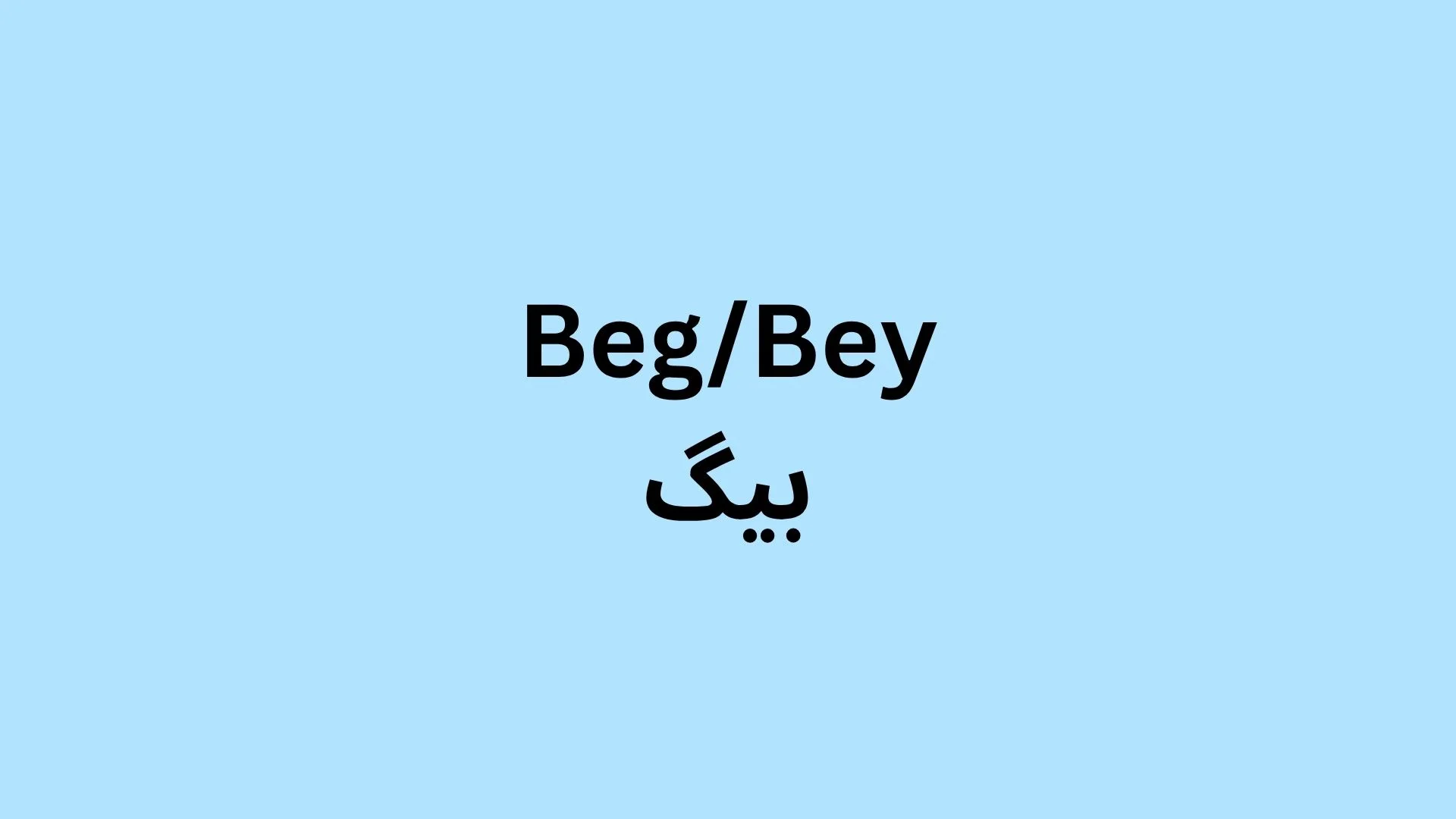Surnames Derived from Beg/Bey
Surnames derived from Beg/Bey hold a deep historical, cultural, and noble significance across many Muslim and Turkic societies. These surnames originate from a title once used for chieftains, tribal leaders, governors, and nobles in Central Asia, the Ottoman Empire, and Persia. Over centuries, the title “Beg” (or “Bey”) evolved into a family surname—often reflecting honor, leadership, or ancestral prestige.
In this post, we explore surnames derived from Beg/Bey, their meanings, origins, and fascinating details, including their Arabic transliterations. These names are still used today in regions like Turkey, the Balkans, Central Asia, the Middle East, and the Indian subcontinent.

| Surname | Meaning | Arabic |
|---|---|---|
| Begović | Son of Beg | بيغوفيتش |
| Al-Beg | The Beg / Noble | البَيغ |
| Begzada | Son of a Beg (Prince) | بيگزاده |
| Mirbeg | Lord Beg | مير بيگ |
| Bektaş | Strong Beg | بكطاش |
| Begumzadeh | Descendant of a Begum | بيگمزاده |
| Begli | Of the Beg / Beg’s lineage | بيگلي |
| Begyan | From the house of Beg | بيجيان |
| Bekri | Related to Beg / Nobility | بكري |
| Begzadaei | Belonging to Beg’s family | بيگزادئي |
Interesting Facts About Surnames Derived from Beg/Bey
- 🔹 Beg (or Bey) was not originally a name but a title given to rulers of smaller provinces or tribes under greater empires, such as the Ottomans or Timurids.
- 🔹 The female counterpart of Beg is Begum, often used as a respectful title for noblewomen in South Asia.
- 🔹 Surnames like Begović (common in Bosnia and Herzegovina) highlight the Slavic suffix “-vić,” meaning “son of.”
- 🔹 In Persian usage, “Begzada” and “Begumzadeh” emphasize descent and aristocracy—showing pride in noble roots.
- 🔹 In modern Turkey, “Bey” is still used informally as a polite title, much like “Mister.”
Selected Surnames Derived from Beg/Bey
Begović
A South Slavic surname meaning “son of Beg.” It reflects a blend of Ottoman and Slavic linguistic traditions, showing the legacy of Turkish rule in the Balkans. Popular among Bosniaks and occasionally used in Serbia and Croatia.
Al-Beg
A compound Arabic-Turkic surname meaning “The Beg.” Often used to honor individuals from noble or administrative ancestry, especially among Arabized Turkic tribes.
Begzada
A Persian-origin surname combining “Beg” and “zada” (meaning son or descendant). It means “son of a Beg,” and was used among aristocratic families in Iran, Afghanistan, and Central Asia.
Mirbeg
Combining “Mir” (lord or commander) with “Beg,” this surname indicates someone of high status. Historically found among Persian or Timurid elites.
Bektaş
Popular in Turkey, Bektaş is believed to derive from a Turkic tribal or spiritual leader. It is associated with the Bektashi Sufi order, indicating not only nobility but also religious reverence.
Begumzadeh
Literally meaning “descendant of a noblewoman,” this surname celebrates both lineage and matriarchal legacy, especially among Mughal-influenced families in India and Pakistan.
Begli
Common in Turkmenistan and Uzbekistan, this surname shows tribal or familial association with a Beg. The suffix -li means “of” or “belonging to.”
Begyan
This Armenized form of a Turkic title reflects the multicultural heritage of Central Asia, where Persian, Turkic, and Armenian influences coexisted.
Conclusion – Surnames Derived from Beg/Bey
Surnames derived from Beg/Bey are more than just names—they are living emblems of history, honor, leadership, and aristocratic legacy. Found across Turkic, Persian, Slavic, and Arab lands, these names are steeped in cultural significance and still hold respect and recognition in modern times. Whether it’s Begović in the Balkans or Begzada in Persia, these surnames serve as a reminder of the noble past and the legacy of leadership in Islamic civilization.
❓ FAQs – Surnames Derived from Beg/Bey
Q1: What does the surname Beg mean?
Beg is a title that means chieftain, noble, or lord. It originated in Central Asia and spread through the Turkic and Islamic worlds.
Q2: Is Beg a common surname today?
Yes, it is still used, especially in South Asia, the Middle East, and Central Asia. Variations like Begum, Begović, and Begzada are also common.
Q3: What is the difference between Beg and Bey?
They are variants of the same title. Bey is more commonly used in Turkey, while Beg is used in Central Asia, Persia, and South Asia.
Q4: Is Beg only used by Muslims?
While its origins are deeply tied to Islamic and Turkic cultures, surnames like Begović are also found among non-Muslim Slavs due to the historical influence of the Ottoman Empire.
Q5: What does Begzada mean?
Begzada means “son or descendant of a Beg”, implying noble or aristocratic lineage.
Read: Understanding “Bin” in Arabic Surnames – Meaning, Origins, and Examples


1 thought on “Surnames Derived from Beg/Bey (e.g., Begović, Al-Beg)”